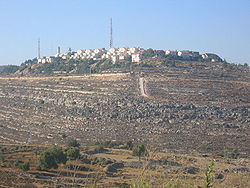Psagot
| Psagot | |
|---|---|
 |
|
| Coordinates: 31°53′57.48″N 35°13′26.04″E / 31.8993000°N 35.2239000°ECoordinates: 31°53′57.48″N 35°13′26.04″E / 31.8993000°N 35.2239000°E | |
| District | Judea and Samaria Area |
| Council | Mateh Binyamin |
| Region | West Bank |
| Affiliation | Amana |
| Founded | 1981 |
| Founded by | Beit VeGan residents |
| Population (2015) | 1,902 |
Psagot (Hebrew: פְּסָגוֹת, lit. Peaks) is an Israeli settlement in the West Bank located north of Jerusalem on Tawil hill adjacent to Ramallah, al-Bireh, and Kokhav Ya'akov. Established in 1981, it is organised as a community settlement and falls under the jurisdiction of Binyamin Regional Council, with the council's headquarters located there. In 2015 it had a population of 1,902.
The international community considers Israeli settlements in the West Bank illegal under international law, but the Israeli government disputes this.
The name Psagot was proposed by one of the early residents, Moshe Bar-Asher, a professor and head of the Academy of the Hebrew Language. It expresses the hope that the new village will achieve a peak in settlement and study of the Torah. The name also refers to the location of Psagot on the peak of Mount Tawil.
The Arabic name of the hill is Jabel Tawil (long mountain).
Before 1967, Jabel Tawil was known to locals as "Kuwaiti hill" because of numerous visitors from the Persian Gulf who hiked in the area. In 1964, some of the land was purchased by the Jerusalem municipality for a future tourist resort. In the Six-Day War, it came under Israeli control. From September 1976, Arabs were prohibited from building in the area.
In 1981, Ariel Sharon, then Israeli Minister of Defense, told Pinchas Wallerstein, head of the Mateh Binyamin Regional Council, that he would support initiatives to settle the area. In July 1981, Wallerstein moved the council headquarters to the hill, then occupied by a military intelligence base. Five families from the Jerusalem neighborhood of Beit VeGan took up residence there. A year later, they were joined by a group from the Kerem B'Yavneh yeshiva who came to create a kollel.
...
Wikipedia

